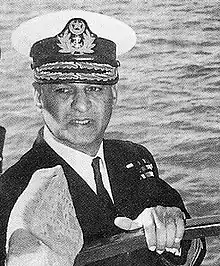Vice Admiral Hasan Hafeez Ahmed | |
|---|---|
 | |
| Chief of Naval Staff of Pakistan Navy | |
| In office 3 March 1972 – 9 March 1975 | |
| Preceded by | Muzaffar Hassan |
| Succeeded by | Mohammad Shariff |
| Personal details | |
| Born | Hasan Hafeez Ahmed 1926: 3 [1] Multan, Punjab, British Indian Empire Present-day Pakistan |
| Died | 1975 (aged 48–49) Karachi, Sindh, Pakistan |
| Citizenship | British Subject (1926–1947) Pakistan (1947–1975) |
| Awards | Tamgha-e-Quaid-e-Azam (1965) |
| Nickname | H.H. Ahmed |
| Military service | |
| Branch/service | |
| Years of service | 1945–1975 |
| Rank | |
| Unit | Navy Executive Branch |
| Commands | Commander Coast (COMCOAST) Comdnt. Cadet College Petaro |
| Battles/wars | World War II |
Vice-Admiral Hasan Hafeez Ahmed (Urdu:حسن حفيظ احمد; b. 1926-8 March 1975: 329 [2]), TQA, usually shortened to H.H. Ahmed, was a senior Pakistan Navy officer who served as the first Chief of Naval Staff (CNS) of Pakistan Navy from 1972 until his death from sickness in 1975.[2]
Despite appointed to the four-star appointment, he was retained at the three-star rank and took over the command of the Navy from its Commander-in-Chief Vice-Admiral Muzaffar Hassan who was dismissed from the military service.
Biography
Hassan Hafeez Ahmad was born in Multan, Punjab, British India, in 1926.: 3 [1] He was educated in a local school in Multan and was a contemporary of Mansoor Shah who would later join the Pakistan Air Force in 1947.: 288–289 [3]
After his high school graduation in 1943, he joined the Royal Indian Navy as a petty officer and participated in World War II.: 289 [3] In 1945, he joined the Britannia Royal Naval College in Dartmouth, England where he graduated in 1947.: 3 [1] Upon returning to British India, he joined the Pakistan Navy and was commissioned as a Sub-Lieutenant.: 3 [1] He continued his training with the Royal Navy and specialized in technical naval courses from the United Kingdom in 1947-49.: 3 [1]
In 1964, he attended the Joint Service Defence College in Latimer Buckinghamshire, England, and subsequently graduated with a joint staff degree in 1965.: 3 [1] Upon his return, he was posted in Ministry of Defence as an undersecretary as a Director of Naval Operations and participated in the Indo-Pakistani war of 1965.: 3 [1] After the war, he was posted to the Pakistan Embassy in Washington D.C. as a military attaché which he remained until 1966.: 3 [1] In 1970, he was appointed as the first commandant of the Pakistan Naval Academy as a Commodore and was appointed as Commander Coast in 1971 as a Rear-Admiral. : 3 [1]: 235 [4]: Annexure [5]
After participating in the Indo-Pakistani war of 1971 he continued to serve as commander of the coastal defense command but demoted to Commodore in the Navy.: 180 [6] In 1972, he was elevated as the first Chief of Naval Staff after the dismissal of Muzaffar Hassan. He was the most junior officer and superseded five senior's including three Rear-Admirals and two Commodores.: 76–77 [7]
As a naval chief, his task was to reconstruct and rebuild the navy into a formidable force.: 46 [8] In a short spa of time, he transformed the Navy into three-dimensional force when he commissioned the naval aviation and commissioning the new Navy NHQ in Rawalpindi in the vicinity of Army GHQ in 1974.: 46 [8]
On 8 March 1975, he died from sickness unexpectedly while serving as naval chief and commanding the navy, at the age of 49.: 44 [9] He was the first of three chief's of staff who died in the office- the others being General Asif Nawaz and Air Chief Marshal Mushaf Ali Mir.
Sources
- 1 2 3 4 5 6 7 8 9 Martell, Paul; Hayes, Grace P. (1974). World military leaders. Bowker. ISBN 9780835207850. Retrieved 3 January 2017.
- 1 2 Rizvi, Hasan Askari (2000). The Military & Politics in Pakistan, 1947-1997. Sang-e-Meel Publications. ISBN 9789693511482. Retrieved 3 January 2017.
- 1 2 Shah, PAF, Air Commodore Mansoor (2002). The Gold Bird: Pakistan and Its Air Force—Observations of a Pilot. Karachi, [pk]: Oxford University Press. ISBN 9780195797725. Retrieved 3 January 2017.
- ↑ Roy, Mihir K. (1995). War in the Indian Ocean. Lancer Publishers. ISBN 9781897829110. Retrieved 3 January 2017.
- ↑ Cardozo, Major General Ian (December 2006). The Sinking of INS Khukri: Survivor's Stories. Roli Books Private Limited. ISBN 9789351940999. Retrieved 3 January 2017.
- ↑ Hussain, Syed Shabbir (2000). Ayub, Bhutto, and Zia: How They Fell Victim to Their Own Plans. Sang-e-Meel Publications. ISBN 9789693510805. Retrieved 3 January 2017.
- ↑ Jafri, Maqsood (2008). The Ideals of Bhutto. National Book Foundation. Retrieved 3 January 2017.
- 1 2 Anwar, Dr Muhammad (27 November 2006). Friends Near Home: Pakistan's Strategic Security Options. AuthorHouse. ISBN 9781467015417. Retrieved 3 January 2017.
- ↑ Ali, S. Akhtar (1 January 1975). "Death of a Silent Admiral". Pakistan Economist. Vol. 15, no. 1–13. S. Akhtar Ali. Retrieved 3 January 2017.
